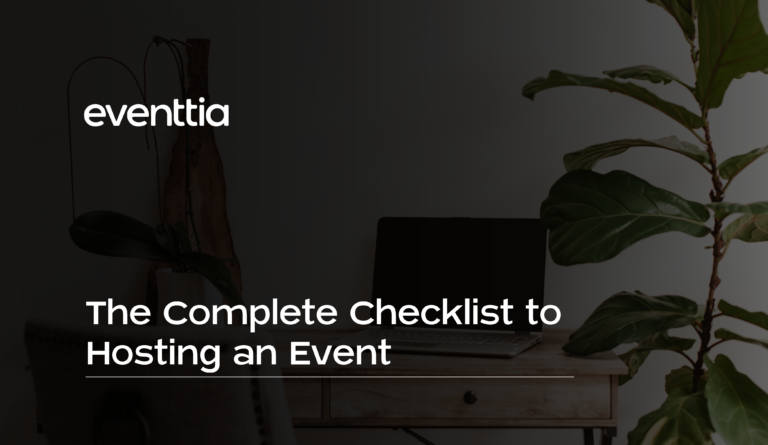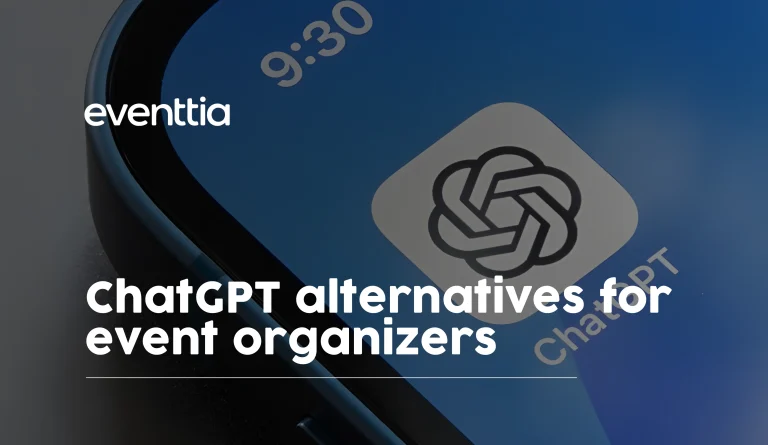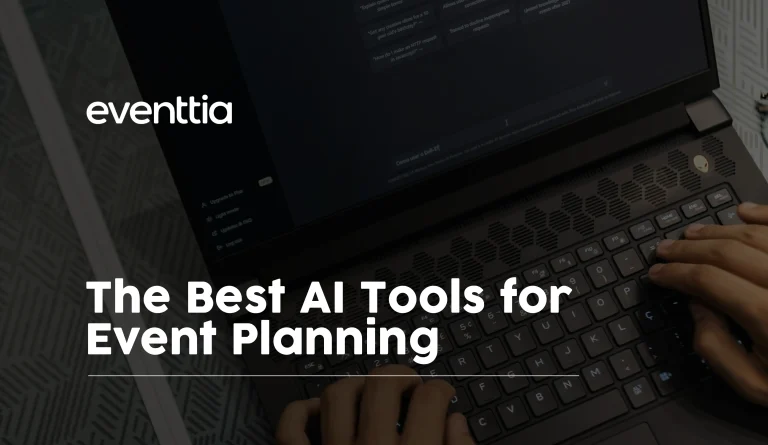Are you currently planning your very first event and are looking for help? We’ve got your back.
Whether you are planning a traditional in-person event, a virtual event, or a hybrid event, in this guide, we’ll share an actionable and comprehensive checklist you can easily follow when planning an event.
By following this checklist, you can be sure to remember all the details necessary for a successful event, as well as keep track of the timelines surrounding the event planning process.
This complete checklist to hosting an event will cover:
- Defining your event’s purpose and objective
- Choosing an ideal event date and time
- Creating an event plan
- Establishing an event budget
- Develop event brand and marketing plan
- Attracting and securing sponsorship
- Choosing and securing speakers/talents for your event
- Ticket pricing and ticket sales
- Coordinating with suppliers and vendors
- Things to consider to ensure smooth D-day setup and execution
- Post-event evaluation
Since a crucial aspect of successful event planning is to maintain a strict timeline, we’ll divide this checklist into several phases so you can easily keep track of your event’s actual timeline based on these phases.
After this checklist, we’ll also share some of the most important event planning and management best practices, so you can use them to make the most of this checklist.
Without further ado, let us begin right away.
Complete Checklist to Hosting an Event
Phase 1: Planning and Preparation
The golden rule of event planning is that the earlier you can start planning and working on your event, the better. You’ll have more options, whether it’s the venue, speakers, date/time, and you’ll also have more time to promote the event and to deal with any issues that may come up.
If you are planning to host a relatively large in-person event (i.e., with more than 500 attendees), then ideally, you should start this first phase at least four months in advance, and ideally six months in advance or more.
If it’s a virtual event or it’s a smaller in-person event, you’ll have more leniency, but at the very least, make sure you have at least two months in advance to prepare the event.
This phase is about laying the foundation of the whole event, and here are the key details you’ll need to consider:
- Define event purpose and objectives. What’s the purpose of planning the event in the first place? (i.e., support a product launch, build brand awareness, support a charity, etc.). Based on this purpose, define relevant goals and objectives for the event, including how many attendees you are hoping to get.
- Select date/time. You can start with a rough timeline (i.e., in September), but the sooner you can secure a fixed event date and time, the better. Carefully assess whether there are other events taking place in your area, and avoid any national/major holidays (people tend to spend time with their family or friends).
- (For in-person events) secure your venue.
- Create a shortlist of potential venue
- Determine your requirements and needs. Whether you can serve alcohol, accessibility concerns, whether you’ll need to get additional insurance, can you bring your own catering, etc.
- Negotiate details with the venue. Make sure every detail is in writing.
- Identify other vendors that may have dependencies with your venue choices (i.e., catering) and secure the details
- Sign contract with venue and vendors
- (For virtual event and in-person event) secure your technology stack:
- Virtual event platform (for virtual event)
- Event management solution
- Online event registration/event ticketing solution
- Attendance check-in
- Marketing and promotion tools
- Other solutions as needed
- Create a master plan. Based on the factors you’ve established above, develop a detailed event master plan. Include at least a rough draft of your event’s agenda to help you ensure you don’t miss any details in the future.
- Establish a temporary budget. Start with cost estimates for the following:
- Venue rental
- Catering (food and beverages)
- Technology stack
- Equipment and furniture
- Talent/speaker fees
- Travel for staff and talents
- Insurance
- License/permit
- Create a detailed budget. Fine-tune your cost estimation and create a detailed event budget. The sooner you can establish your complete budget, the easier controlling your expenses will be.
- Establish an event team. If you are planning to run the event on your own, skip this. However, you should consider creating an event team that covers the following basic roles:
- Event manager. Pretty self-explanatory, responsible for overseeing the entire event planning and execution.
- Marketing coordinator. Creating a marketing plan and responsible for all things related to promoting the event.
- Social media moderator. Essential, especially if you are also planning to stream the event (and for virtual events.)
- Venue manager. Responsible for everything related to the venue, the main contact person for vendors and sponsors when on the venue.
- Logistic manager. Responsible for clearances and loading.
- Security manager. Planning and implementing security plans and strategies.
- Develop an event brand.
- Event name. Make sure the name is easy to pronounce and remember and is relevant to the event’s theme.
- Event logo. Your logo should support the event’s name and theme and not the other way around.
- Tagline. It should be catchy and easy to remember and tell your target attendees what the event is about.
- Social media. Create social media handles and build your audience.
- Event website. A dedicated event website or a dedicated page on your company’s website that acts as an information hub for the event.
- Marketing plan. Develop comprehensive marketing, promotion, and publicity plans. The plan should also include the roles and responsibilities of different staff/volunteers for promoting the event.
- Identify speakers/talents/presenters.
- Create a shortlist of talents you’d like at the event
- Contact the talents
- Negotiate and confirm
- Identify and contact sponsors/partners.
- Ticketing:
- Establish ticket prices, including prices for different tiers/phases
- Release pre-launch/early-bird tickets
Phase 2: Executing The Details
Once you’ve established the foundational elements of your event, you can move to the next phase and start figuring out the details. If you start six months prior to the D-Day, then this phase should start at around the 4-month mark.
Here are some important details to work on during this phase:
- Finalize the event design. This is about finalizing the details of your event, especially on components that impact attendees the most:
- Agenda/schedule. Plan a detailed agenda for your event
- Event script. Draft event script (i.e., opening, speaker introductions, thanks, etc.) Finalize the script if possible.
- Timeline. A detailed map of the event’s timeline
- Layout. All the details, including seating arrangements, traffic flow, placement of power stations and electrical cords, etc.
- Decoration. Carefully think about all the details, and focus on catering to your target audience’s needs and preferences.
- Catering. Finalize your catering after carefully researching and interviewing different vendors. Don’t forget to consider dietary restrictions when planning your menu.
- Documents. Create and/or acquire required documents for your whole team (including volunteers)
- Talents’/speakers’/presenter’s needs:
- Ask for presentation/speech topics. If possible, ask for finalized speech/presentation in a written format for review.
- Well-taken photo
- Bio information
- Travel/accommodation arrangements (for in-person events)
- If possible, have contracts finalized and signed.
- Ask talents/speakers/presenters to start promoting the event with their followers.
- Venue details:
- Catering menu
- A/V equipment. Including rental of additional equipment if needed.
- Signage. Don’t forget not-so-obvious ones like registration and parking signages.
- Security needs. Review security plan and make sure all details have been established.
- Permits and licenses. Check whether additional licenses and permits are required.
- Accessibility requirements. Unisex restroom, wheelchair accessibility, etc. Develop clear accessibility policies and communicate them with staff and volunteers.
- Administrative details:
- Set up online registrations. Finalize ticketing price/registration fees if you haven’t already
- Sponsorship. Finalize sponsor contracts and details.
- Due diligence. Identifying items to be underwritten establishes a clear audit trail.
- Ongoing marketing efforts:
- Develop marketing materials. Including but not limited to ads, articles (for advertorial/content marketing), social media promotion posts, video marketing materials, etc.
- Develop and public press release.
- Request logos and branding details from sponsors and corporate partners to include in marketing materials.
- Production.
- Invitation
- Schedule
- Event map
- Posters
- Tickets
- Etc.
- Determine VIPs and create VIP invitations
- Create and optimize an event page or event website
- Launch email marketing
- Register your event on a variety of event promotion websites and online event calendars
- Prepare/order event swag bag
Phase 3: Finalizing More Details
Around two months prior to the D-Day, you should move to the next phase and focus more on finalizing more details, including:
- Final marketing push:
- Send email reminders to your contact list for registrations.
- Online ads
- Influencer marketing
- More videos on YouTube, etc.
- Post more details about the event on social media
- Follow-up press release regarding highlight speakers/talents, attending VIPs/celebrities, and more.
- Release more marketing materials to all partners, affiliated businesses, etc.
- Finalize all documents and printed materials
- Talents’/speakers’/presenters’ finalization:
- Request finalized written copy of presentation/speech.
- Confirming accommodation and travel details.
- Sponsorship finalization
- Review all underwriting details and perform final confirmation on sponsorship
- Acquire all promotional materials from sponsors that will be shared at the event
- Request sponsors to promote the event on their social media and other channels
- Release standard ticket pricing. Close early-bird promotions
Phase 4: Last Touches
You’re almost on D-Day. In this phase (1 or a couple of weeks prior to the event), you should’ve finalized the majority of the event details. If that’s the case, this page will mainly be about final touches, such as:
- Confirm all details against the event plan.
- Develop backup plans for various worst-case scenarios
- Assign backup roles as needed
- Plan for redundancies in all elements
- Brief all staff and volunteers about their duties and timelines for the D-Day
- Finalize event script.
- Schedule practice session(s). Everyone with a speaking slot should be assigned at least one practice session
- Finalize seating plan
- Finalize traffic flow. Pay attention to accessibility requirements (i.e., wheelchair-accessible areas)
- Finalize catering. Provide final registration numbers to the caterer.
- Make copies of all speeches.
- Make copies of all videos and presentation materials. If it’s a virtual/hybrid event, arrange so that these copies are easily accessible online by attendees.
- Final registration check. As soon as registration closes, finalize details like the final registration list and production of name badges. The sooner you can finalize this, the better.
- Media details. Finalize details with media attendees
- Finalize interview and photo opportunities with attending VIPs, celebrities, presenters, etc.
Phase 5: D-1
We’re almost on the D-Day, and in this phase, you’d want to double-check everything, including:
- Final check on the venue.
- Finalize traffic flow
- Final check registration area(s). Make sure necessary items are prepared (pens, paper, etc.)
- Final check on media tables. Again, make sure necessary items are prepared (name badges, etc.)
- Make sure all signage is in place. Including any areas outside the venue in which signage is needed
- Final check on A/V equipment. Do multiple sound checks as required
- Final check on promotional materials installed on the venue.
- Final check on miscellaneous items. Swag bags, trophies, plaques, etc.
Phase 6: D-Day
Finally, the actual day of the event has arrived!
Some things to consider during the D-Day:
- Prepare copies of instructions.
- Venue map
- Schedule
- Directions
- Contact information. Important phone numbers
- Seating charts
- Guest list
- Prepare backup keys as needed
- Parking arrangements for VIP guests
- One last final check with your event team. Make sure every department is on track
- Final check with catering
- Final check with attending sponsor teams
- Assist talents/speakers, sponsors, and vendors as needed
Phase 7: Evaluation and Post-Event Follow-Up
Congratulations! You’ve hosted your event, and hopefully, it’s a successful one. However, your job doesn’t stop there, and there are some post-event details that you should take care of.
- Send thank-yous:
- Sponsors
- Staff and volunteers
- Talents/speakers/presenters
- Media attendees
- Donors (for charity events)
- Your attendees
- Lost and found. Final check with the venue, and nothing was left behind. Arrange lost and found as required
- Finalize financial details:
- Update your budget with final expenses
- Gather all necessary data:
- Documentations
- Contracts
- Receipts
- Final registration data
- Etc.
- Post-event survey. Reach out to event attendees, thank them for participating and send them a post-event survey to collect feedback and insights. Learn what they liked about the event and how you can improve your future events.
- Post-event marketing:
- Share event highlights on social media.
- Update the event page/website as needed. Make sure visitors understand it’s a past event.
- Send an email newsletter with highlights from the event.
- Create a video reel to share how the event went. You can use this reel to promote your next event.
- Debrief your team. Gather feedback from your staff and volunteers. Conduct internal post-event survey as needed
- Event evaluation. Objectively learn what went well and identify areas where you can do better next time
That’s it! If you’ve finished this checklist to the end, you’ve probably hosted a successful event. If you are still in the middle of planning your event, you can print this checklist and assign the activities to your team members or volunteers.
In the next section, we’ll discuss some of the best practices to maintain when planning and hosting an event so you can make the most of this checklist.
Event Planning Best Practices To Ensure Success
1. Define Your Event Objectives
A very common mistake made by event planners is not knowing the purpose of hosting an event in the first place (i.e., hosting an event for the sake of having an event to host).
Yet, if you don’t know your purpose, you won’t be able to set your event goals, and then you can’t identify the right direction for your journey. You are literally setting your event for failure, and you won’t be able to measure its performance and calculate your ROI.
As early as possible on the event planning cycle, and ideally before planning anything, you should try to answer these questions:
- What do you hope to achieve from hosting the event?
- What are your organization’s business goals? How can this event help you achieve these goals?
- How will you define success for this event? (i.e., what metrics will you measure?)
- Who are your ideal target attendees to help you achieve your event goals?
- Who are your ideal sponsors?
We’d recommend following the S.M.A.R.T goals framework when defining your event goals; ensure your goals are Specific, Measurable, Attainable, Relevant, and Time-Bound.
2. Focus on Delivering Great Attendee Experience
No matter what the objective(s) of your event is, your main focus should be to ensure amazing experiences for your attendees. Satisfied attendees will come again on your future events and will help promote your events and your brand to their peers.
Here are a few tips:
- Content is king. Make your events more engaging by designing great content. Great content here must go beyond inviting famous speakers, presenters, or celebrities, but your event must genuinely have something new your audience can learn or enjoy.;
- Incorporate fun and engaging activities (gamification) throughout the event like games, mingling/networking opportunities, and more.
- Don’t underestimate good foods and event swag. You can also send your event swag before the party to encourage your attendees to get excited about the event and share it on social media.
- Especially important for virtual/hybrid events, and interactive elements like live chat, Q&A, and polls to keep attendees engaged instead of getting distracted.
Also, whenever possible, you should try to personalize your attendee’s event experience, which can significantly boost their engagement. For example:
- For virtual/hybrid events, you can curate content agendas based on each attendee’s preferences.
- Create separate networking sessions so you can group attendees based on interests or preferences.
How can you know your attendees’ preferences? A simple approach is to ask them about their preferences and interests with a pre-event survey
3. Attracting Sponsors By Providing Value
Most likely, you are going to rely on sponsorships to fund your event and to generate revenue, but we all know securing sponsorships can often be the biggest challenge in planning an event.
The secret to securing sponsorship is to ensure your prospective sponsors can see enough value from your event, so they’ll have more reason to fund your event.
Everyone will offer lead generation and brand exposure/awareness opportunities, and you have to be more creative and go beyond those.
Again, the better you understand your sponsor’s needs and preferences, the better you can create value for them. Research your prospective sponsors carefully, and create custom-tailored offers such as:
- Get sponsors involved in giveaways, contests, and other gamification activities. This can help attract more attendees to sponsors’ booths and content.
- Be creative with sponsor booths, and find ways to help them showcase their brand values and offers via custom-tailored booths.
- Offer the opportunity to sponsor event swag so you can put their logo on gifts.
Also, consider offering tiered sponsorships so you can give them multiple options to participate in your event.
4. Leverage Technology To Ensure Success
As we can see from the checklist above, planning and hosting an event can be challenging with all the different moving parts involved.
This is where event management solutions and other technology tools can help.
Today, there are all-in-one event management tools like Eventtia that can help you with all aspects of event planning and management: online registration, attendee check-in, virtual event platform, marketing/promotion tools, and pre/post-event surveys.
Identify your needs, and choose the right event management solution that can help you achieve your event objectives.
5. Track and Monitor Everything
Establish a system to monitor your event’s performance. Objectively understanding how your event performs against KPIs has twofold importance: you can create a better event next time, and you’ll have a valid way to prove your event’s ROI to future sponsors, investors, and partners.
Don’t leave anything to guesswork, and track all the important metrics to measure your event’s success.
Here are some of the most important metrics to monitor for measuring event success:
- The ratio between the total number of event check-ins and the total number of registrations
- Top-performing sessions and worst-performing sessions
- The response rate to polls and Q&A
- Social media mentions
- Cost to revenue ratio
- Sponsorship satisfaction (via post-event survey)
- Attendee satisfaction
- Number of returning attendees
- Etc.
Wrapping Up
While planning and hosting an event might seem like a major challenge at first glance, by using the checklist we’ve shared above, the process will be much easier, and you no longer need to keep track of all the details.
Above, we have also shared some of the most important event planning and management best practices to follow; you can start planning and organizing a successful event right away.
Discover how Eventtia helps world-leading brands digitize and scale their events
Learn moreShare





